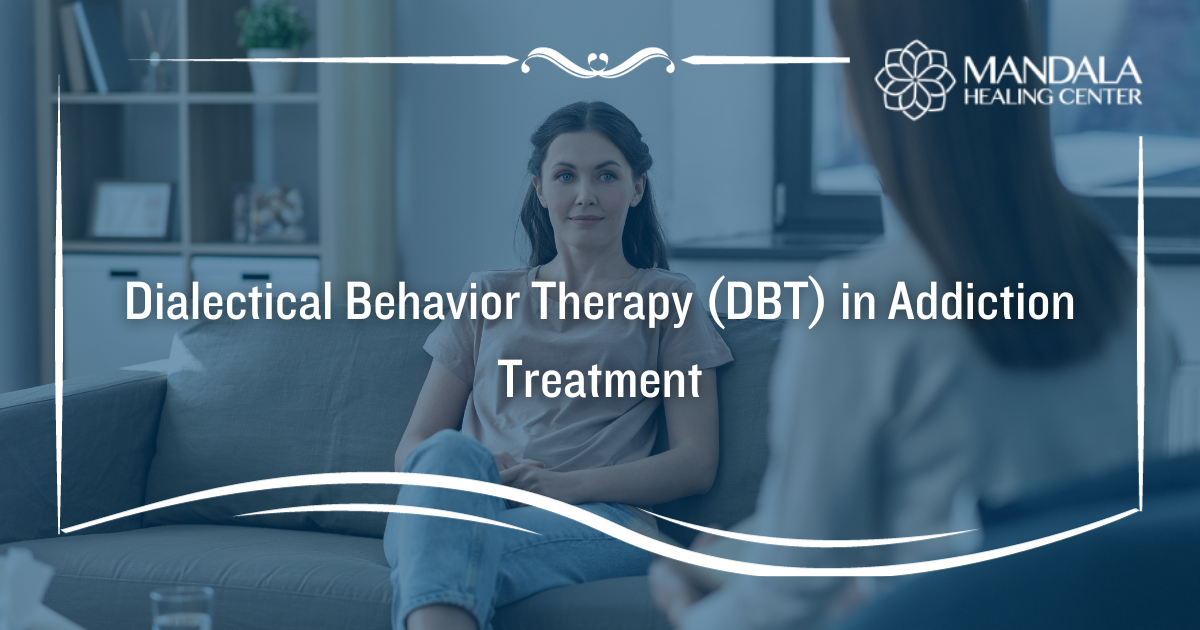Addiction is a chronic and complex disease that can cause various adverse effects, including severe psychological distress. Various types of therapy are implemented into addiction treatment plans to provide clients with the healing they need to recover. One of the types of treatment proven effective in aiding addiction recovery is dialectical behavior therapy (DBT).
DBT is an evidence-based type of psychotherapy that may be used to treat several mental health conditions. Initially developed by Dr. Marsha Linehan in the 1980s and based on cognitive behavioral therapy (CBT), this therapeutic model was designed to treat severe mental illness and high-risk behaviors like suicidality.[1] While CBT teaches people how to avoid or work around uncomfortable emotions, DBT focuses on validating and accepting them to overcome them.
How Does Dialectical Behavior Therapy (DBT) Work?
Dialectical behavior therapy is a comprehensive approach to mental health recovery that focuses on developing skills to change unhealthy thoughts and behaviors. Therapists create a collaborative relationship with their clients to teach them critical behavioral skills.
DBT uses a variety of approaches and techniques to initiate healthy behavior changes, including:
- Mindfulness- Mindfulness is a vital aspect of DBT that helps clients tune into the present moment and accept their feelings and emotions as they arise. As a result, they can learn to work through their emotions instead of avoiding them or engaging in unhealthy coping mechanisms.
- Interpersonal Skills- Many clients who engage in DBT have a hard time with relationships. Their therapist will help them build interpersonal skills to repair, maintain, and establish healthy behaviors and boundaries in all of their relationships with others.
- Emotional Regulation- Emotional regulation is one of the most important skills taught during DBT. By showing clients how to identify, name, and challenge the effects of a negative emotional response, they can begin to make positive changes.
- Distress Tolerance- Distress tolerance techniques are taught to help clients accept that negative emotions and distressing situations are a part of life. Additionally, they will be taught how to implement healthy coping mechanisms during stressful situations to help them maintain their mental health during a crisis.
Substance abuse makes it difficult for a person to learn how to deal with their feelings in a healthy manner, so these techniques are incredibly beneficial to people suffering from addiction. Dialectical behavior therapy can provide you with the skills you need to tackle uncomfortable emotions, negative behaviors, and distressing situations with tact.
What Conditions Can DBT Treat?
While DBT was originally created to treat women with suicidal tendencies, this therapeutic model is effective for a wide range of mental health conditions. The most common mental illness to be treated using DBT is borderline personality disorder (BPD). Because people with BPD experience intense emotions, the skills and techniques taught during this type of therapy can be extremely useful.
Dialectical behavior therapy has been proven effective in treating the following conditions:[1]
- A wide range of personality disorders
- Anxiety conditions
- Depression
- Eating disorders
- Bipolar disorder
- Attention-deficit hyperactivity disorder (ADHD)
- Post-traumatic stress disorder (PTSD)
- Substance use disorders (SUDs)
If you suffer from addiction and a co-occurring mental illness, dialectical behavior therapy will likely be an effective treatment model for you. Oftentimes, the emotional symptoms associated with a co-occurring mental health condition exacerbate the behavioral effects of addiction. DBT can teach you how to regulate your emotions and change negative patterns of behavior.
What are the Benefits of DBT in Addiction Treatment?
Many people develop addictions to substances because they are attempting to self-medicate their intense and negative emotions. Since addiction is rooted in emotional dysregulation, dialectical behavior therapy can be incredibly beneficial for patients with substance use disorders.
The benefits of using DBT in addiction treatment include:[2]
- Decreasing overall substance abuse
- Decreasing the physical discomfort associated with withdrawal symptoms
- Lessening impulsivity, cravings, and temptations associated with addiction
- Learning to create and enforce healthy boundaries that are necessary for sobriety
- Learning to avoid triggers and events that could lead to substance abuse
- Reducing the unhealthy behaviors that lead to substance misuse
- Increasing healthy interpersonal relationships that stimulate sobriety and provide a sense of community
According to the National Library of Medicine (NLM), DBT provides “nonjudgmental, problem-solving responses to relapse that include techniques to reduce the dangers of overdose, infection, and other adverse consequences.”[2]
Get Connected With a DBT Drug and Alcohol Rehab Program
If you or a loved one struggles with addiction or co-occurring disorders, you might find success in an addiction treatment program that provides dialectical behavior therapy. Rehab facilities like Mandala Healing Center can provide you with individualized treatment planning to determine what methods of treatment are best suited to your needs.
To learn more about how DBT in addiction treatment can help you recover, contact us today.
References:
- The National Library of Medicine (NLM): Dialectical Behavior Therapy, Retrieved September 2023 From https://www.ncbi.nlm.nih.gov/pmc/articles/PMC2963469/
- The National Library of Medicine (NLM): Dialectical Behavior Therapy for Substance Abusers, Retrieved September 2023 From https://www.ncbi.nlm.nih.gov/pmc/articles/PMC2797106/












